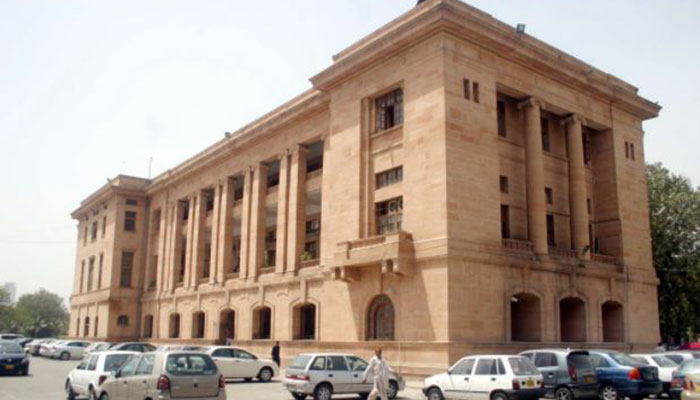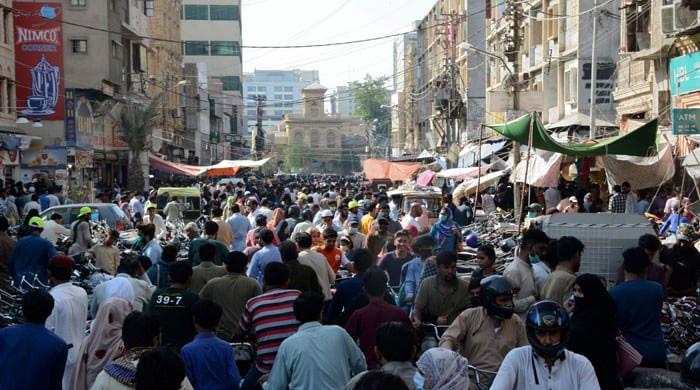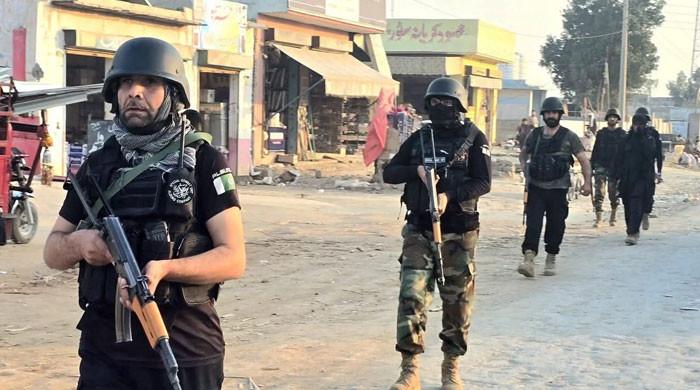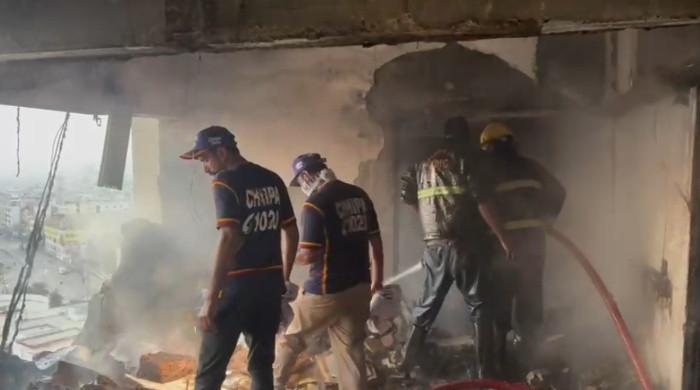SHC order in Sindh IG AD Khawaja case
The court has ordered the dismissal of the Sindh IG's removal by the provincial government
September 07, 2017

The order of the Sindh High Court in the AD Khawaja case is spread over 98 pages.
Its operative part is reproduced below:
101. It will be convenient, before concluding, to set out in one place some of the orders made and directions given above (and also make certain additional orders and directions).
We emphasize that this paragraph is not intended to be self-contained, and must be read in the light of, and conformably with, what has been stated in this judgment as a whole.
Thus, e.g., any view, observation, order, direction or conclusion not included herein is not for that reason to be ignored or disregarded.
All orders made and 94 directions given herein above must be given full, due and proper effect.
Subject to the foregoing, the following orders and directions may be noted:
a. There is associated with the post of Inspector General a term or tenure as set out in the Sindh Government Rules of Business, 1986.
b. The term is part of the law of the land insofar as this Province is concerned. It cannot be disregarded, disobeyed or flouted by the Provincial Government. It has mandatory and binding effect. It must also, as explained herein above, be given due recognition by the Federal Government.
c. The present incumbent of the post of Inspector General, the Respondent No. 7, is therefore entitled, subject to what is said below, to have the benefit of the term associated with the post.
d. The manner in which PSP officers are to be appointed to the post of Inspector General has been considered in detail herein above.
e. Since the post of Inspector General has a fixed term associated with it, the rule laid down by the Supreme Court in the Anita Turab case is applicable. Therefore, if at all an incumbent can be removed during the term that can only be for compelling reasons within the meaning of the rule.
f. If at all the Provincial Government (meaning the Provincial Cabinet) is of the view that the continuation in office of the Respondent No. 7, on account of his having been appointed on OPS basis, is contrary to the law enunciated by the Supreme Court in the Ghulam Fareed case, and that this constitutes a compelling reason it must follow the proper procedure in accordance with law, as explained in detail herein above. The role to be played in such circumstances by the Federal Government has also been elaborated.
g. Since the proper procedure in accordance with law has not been followed, the correspondence addressed by the Provincial Government to the Federal Government on 31.03.2017 and the follow up notification of 01.04.2017 are quashed as being contrary to law and of no legal effect. The endorsement by the 95 Sindh Cabinet of the foregoing at its meeting held on 05.04.2017 (vide agenda item No. 6) is also set aside as being contrary to law.
h. There is a need for reforms of policing and the police force for law and order to be properly established, which is a sine qua non for the rule of law and which, in turn, enables fundamental rights to be fully and properly enjoyed. In order for fundamental rights to be effectively enforced in this Province, suitable directions can, and should, be given and appropriate orders made under Article 199 of the Constitution. One problem in particular that has been identified by the Petitioners is the rapid turnover in, and bewildering rapidity with which, postings and transfers are made in the police force at all levels. This farcical situation is wholly inimical to the stability of, and any meaningful performance by, the police.
i. In order to redress the situation, there must be autonomy of command and independence of operation in the police force. The police hierarchy, acting through the Inspector General, must have control over its own affairs especially insofar as postings and transfers are concerned (but certainly not limited to that) and outside interference, whether by the Provincial Government or any body or authority thereof or otherwise, (including any minister of any rank) must come to an end.
j. For purposes of giving directions and making orders for enforcement of fundamental rights, the Police Act ought to be interpreted and applied by adopting the approach articulated by the House of Lords in the Ghaidan case, in applying the (UK) Human Rights Act, 1998. Sections 3, 4 and 12 of the Police Act in particular have been so interpreted and applied, keeping in mind at all times the objective identified above, namely that there must be autonomy of command and independence of operation in the police force.
k. With specific reference to s. 12, detailed directions have been given for the formulation of rules to properly regulate postings and transfers in the police force in accordance with law.
l. Pending formulation and adoption of such rules, and with immediate effect, the power of transfers and postings in the 96 police force, at all levels and including that of PSP officers, shall be exercised only by the Inspector General, and any orders issued by him in this regard shall be self-executing. Without prejudice to the foregoing, such orders will also be forthwith given full effect by the Provincial Government, including all Departments and authorities thereof.
m. The order/notification that appears to be currently in the field in relation to postings and transfers, dated 07.07.2017, is quashed as being contrary to law and of no legal effect. Any and all other such orders, notifications, circulars etc. (including any issued subsequent to 07.07.2017) are likewise quashed and declared to be of no legal effect.
n. In terms of s. 4 of the Police Act, as interpreted and applied herein above using the Ghaidan approach, the administration of the police force vests in the police hierarchy acting through the Inspector General. His role is a key and central one. His position is at the apex of the force. Any attempt therefore to sideline or marginalize the Inspector General or to circumvent him or to otherwise curtail his powers directly or indirectly (by, e.g., holding meetings with police officers to which the Inspector General is not invited) would be contrary to law and of no legal effect. It could, among other things, expose any police officer concerned to appropriate disciplinary or other proceedings, whether by way of misconduct or otherwise. The command structure of the police hierarchy is clear. It flows from, to and through the Inspector General. There can be no autonomy of command, nor independence of operation without this.
o. If at any time the Provincial Government (here meaning the Provincial Cabinet) amends or alters the 1986 Rules in relation to the term or tenure of the Inspector General, such term cannot under any circumstances be reduced to less than three years. Furthermore, no authority or body can be given any power to curtail, reduce, suspend or otherwise dispense with the stipulated term. However, any such change, if ever made, shall apply also to the incumbent for the time being of the post of Inspector General. 97
102. We would also like to emphasize that in this judgment we have touched upon only some aspects of the very many problems relating to policing, the police force and the law and order situation. The reform of the police force, the revival of proper and effective policing, the regaining and restoration of law and order, and the enforcement of fundamental rights in the fullest sense is an on-going exercise and a work-in-progress. The problems and issues are many, and may need to be treated again in fresh petitions and other proceedings. However, even if this judgment proves to be but one link in that chain, it is hopefully a step in the right direction (if we may mix metaphors a bit).
103. In view of the foregoing discussion and analysis, these petitions are disposed off in the following terms:
a. It is declared that the legislative competence of “Police” is in the exclusive Provincial domain.
b. It is declared that the Sindh (Repeal of the Police Order, 2002 and Revival of the Police Act, 1861) Act, 2011 is intra vires the Constitution, and that therefore the Police Act, 1861, as revived and restored by the said Act is the law in force in this Province and not the Police Order, 2002.
c. The Respondents, and all authorities and bodies of the Provincial Government, and also as appropriate the Federal Government and all authorities and bodies thereof, are directed to give full and immediate effect to the orders made and directions given in this judgment and to act only in accordance and conformably with the same.
d. Without prejudice to the generality of the foregoing, the Respondents as aforesaid are directed to give full and immediate effect to the orders made and directions given in para 101 of this judgment and to act only in accordance and conformably with the same.
e. The Respondents as aforesaid are restrained from acting in any manner that is inconsistent with, or which contradicts, any orders made or directions given in this judgment and, without prejudice to the generality of the foregoing, from issuing, acting upon or giving effect to any circular, notification, guideline, instruction, order or direction that is inconsistent with, or contradicts, this judgment. 98
f. There will be no order as to costs













